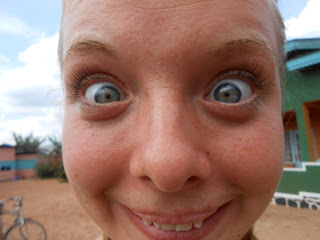For example, one of the things people eat here is cassava root. It is white and chalky. It fills the stomach, but has no nutritional value. There has been some attempts to encourage people to abandon cassava.
I met a lady at the Internet café one day. She travels around Burundi and hosts conferences to educate mothers. She gives the mothers a meal to try, and teaches the mothers the importance of cooking different foods. The variety of food provides kids the nutrition they need. I asked her if they promote deworming pills, because I had heard that worms can take up to 30% of the nutrition and food from a person. She said they didn't promote medicine or deal with medicine. I had some deworming pills with me, and she asked if she could have them for her grand daughter.
For birth control, I've seen several posters advertising the condom brand Class. But...birth control is taboo. People don't talk about it, and the Christian and Catholic churches discourage it in Burundi. For term one, the science teacher before me taught some sex education. When I asked kids the first day of school what they wanted to learn about in science, many of them wanted to learn more about sex education. I will probably have to touch on that next term.
AIDS is a problem in Burundi, but it's not something I have seen a lot of issues with during my time in Africa. I have heard about educating people about AIDS through radio commercials.
Many people in Burundi don't have television. Some listen to the radio religiously. Many don't know how to read. So...one way that has been effective for educating people is through murals. These are some pictures of murals Hanna took while in Cankuzo.
 |
| This mural shows problems associated with drinking. |
 |
| This mural shows the issues associated with smoking. |
In the next mural, it shows the man whistling. I'm guessing that's to show that the man isn't hindered in his life, but I wonder if it relates to more. In Burundi, the stereotype is that if a woman whistles, it means she is uneducated. So, women generally don't whistle.

I'm not sure what this mural is about. I think it's about encouraging one another.
 |































